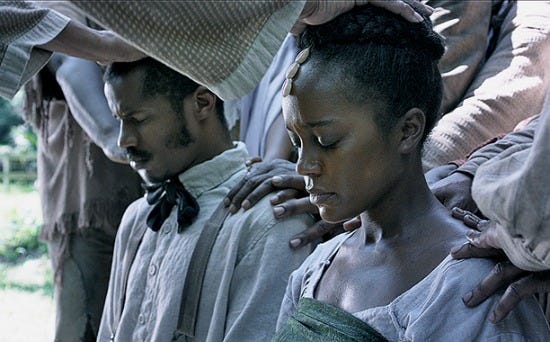The Birth of a Nation

The most surprising thing about “The Birth of a Nation” is the quiet lyricism it brings to the brutal depiction of American slavery. We’ve seen the cruelty before — the flesh-tearing whippings, the use of women as sexual chattel, the everyday degradation of men — most recently in “12 Years a Slave” and the television reprise of “Roots.”
But Nate Parker, who stars, wrote the screenplay and directed, offers both tenderness and righteous anger in the story of Nat Turner, a black slave preacher who led a violent rebellion in 1831 Virginia.
It’s a film of exquisite beauty exploring the ugliest chapter in the story of America.
This movie is perfectly posited for this moment in time in our national conversation about race and violence, with too many African-Americans gunned down by police under often-questionable justification.
Parker’s approach is biblical in tone without ever becoming preachy. He does not present Turner’s revolt as “right” — seeing as it included the deaths of some 60 whites, including women and children — but the inevitable outcome of generations of suppressing a people’s liberty and very humanity.
Nat Turner begins as a normal kid, singled out for his intellect and raised inside the plantation house, growing up the playmate of the owner’s son, Samuel. Forced to return to the fields after the master’s death, Nat becomes the slaves’ spiritual leader, exhorting them to follow scripture and submit to the will of their masters.
He is, in essence, a “safe” slave in a culture where whites are constantly fearful of reprisal from their slaves, who often outnumber them. Nat is so effective at keeping the peace that Samuel (Armie Hammer), now the master, agrees to rent him out to other owners to preach to their slaves and soothe them.
Samuel is presented as a fairly tolerant master, an ineffectual drunkard who barely bothers with the upkeep of the farm, so Nat is horrified at the treatment he sees at other plantations. In one painful scene, the teeth of a slave refusing to eat are casually knocked out with a hammer and chisel so a nasty gruel can be forced down his throat.
We witness Nat begin to slowly change, from a man patiently awaiting his kingdom in heaven to one who resents the hell he’s being forced to live through on earth. He’s haunted by visions, blood pouring from the crops, and believes he’s being called upon by God.
That feeling is accelerated when his beloved wife, Cherry (Aja Naomi King), is ravaged by some bestial slave hunters, with Jackie Earle Haley playing the leader who has a personal past with Nat.
The movie mostly follows the historical record, while fiddling with some details. For instance, Samuel Turner was the brother, not the son, of Nat’s original owner. And Nat was sold to another slave owner, Giles Reese, by the time of the uprising. But these are largely quibbles that do not detract from the tale.
The imagery in the movie will haunt you: the feet of men and women gracefully swinging after being lynched; a young slave child skipping merrily while a girl uses a noose as a leash for her plaything. Its very gracefulness makes the horrors stand out further. The cinematography by Elliot Davis and the spare musical score by Henry Jackman are both wonderful.
“The Birth of a Nation” shares a title with a seminal 1915 film by silent film master D.W. Griffith, which is a technical marvel that established much of the cinematic language we understand today — but also celebrated the rise of the Ku Klux Klan. Parker has made a conscious effort to reclaim the name from its racist past.
Normally I’d be inclined to call that an act of stupendous pomposity. Except that Nate Parker’s film truly is a rebirth, a new cinematic declaration for this young century. It is a chorus of rage, sung without malice but also without apology.



